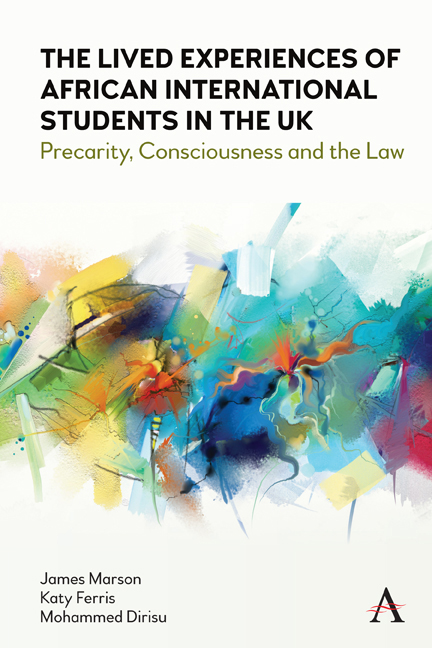 The Lived Experiences of African International Students in the UK
The Lived Experiences of African International Students in the UK Book contents
- Frontmatter
- Contents
- Preface
- Acknowledgements
- Legislation
- Case Law
- 1 Introduction
- 2 Methodology
- 3 Student Migration and Global Inequality
- 4 Migration as a Socio-Legal Phenomenon
- 5 The ‘Student-Migrant-Worker’ Meets ‘Precarity’
- 6 The ‘Utterly Transactional Worker’
- 7 Semi-Legal Working?
- 8 Conclusions
- Bibliography
- Index
8 - Conclusions
Published online by Cambridge University Press: 13 September 2022
- Frontmatter
- Contents
- Preface
- Acknowledgements
- Legislation
- Case Law
- 1 Introduction
- 2 Methodology
- 3 Student Migration and Global Inequality
- 4 Migration as a Socio-Legal Phenomenon
- 5 The ‘Student-Migrant-Worker’ Meets ‘Precarity’
- 6 The ‘Utterly Transactional Worker’
- 7 Semi-Legal Working?
- 8 Conclusions
- Bibliography
- Index
Summary
Introduction
This concluding chapter draws together the main findings from the study. We present an answer to the question we posed in the first chapter regarding the lived experiences of student-migrants with respect to the legal restrictions affixed to their employment rights while studying in the UK. As a supplementary, we reiterate the ways through with this study offers a contribution to the existing body of literature, before, finally, we identify areas for further research which build on the insights generated from our study.
The Lived Experiences of Student-Migrants with Respect to Their Employment Position
It will be remembered that in Chapter 1 we posed the overarching question on which our study was based. To this end, we wished to examine the lived experiences of student-migrants as workers in relation to the legal restrictions affixed to their employment rights while studying in the UK. This question was premised on the designation of international students as subjects of immigration control. In respect of Tier 4 study visa conditions, international students have generally been restricted to a maximum 20 hours of employment per week during term time, and also proscribed from undertaking work autonomously as independent contractors or self-employed. These restrictions were aimed at keeping students true to the purpose for their admission into the country, protecting them from burnout that can follow from having to juggle extensive employment with study commitments, and finally (argued by some at least), protecting domestic workers from undue competition. This agenda also implicates the state's efforts towards ensuring students keep to these employment restrictions and the codified proscription of illicit migrant labour. These efforts were marked by the ‘whole Government’, the ‘degrees of harm’ approach and the provisions of the Immigration Act 2016.
In an effort to address the issue of student-migrants working, we reviewed the current and available literature on student migration, migrant labour with regard to insecure employment, and migration as a socio-legal phenomenon. In so doing we identified the ways through which this book consolidates the, albeit, limited empirical investigations into this phenomenon, while highlighting the underlying justifications for its empirical agenda.
- Type
- Chapter
- Information
- The Lived Experiences of African International Students in the UKPrecarity, Consciousness and the Law, pp. 199 - 208Publisher: Anthem PressPrint publication year: 2022


